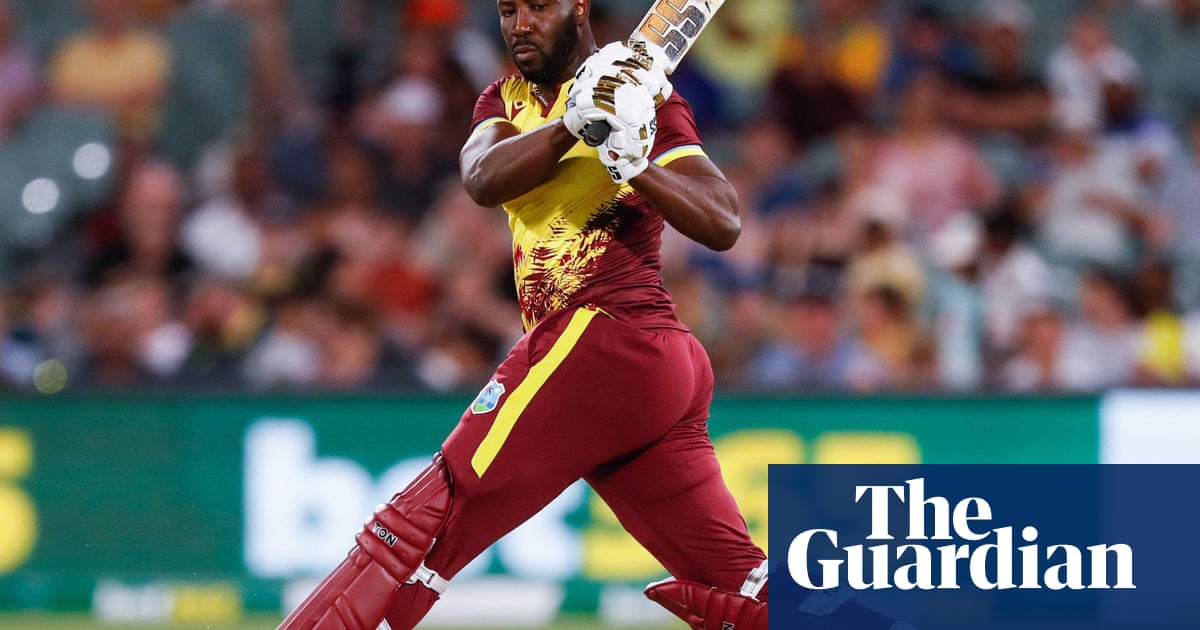Andre Russell has a favourite six. One that he thinks of when his head hits the pillow at night. Out of all the cloud-busting strikes that have flown from his blade in the last 15 years, all the boundary-clearing smites across the globe, delivered with dead-eyed assassin temperament under his trademark bleached mohawk. One shot stands out. One six to rule them all.
“The one off Hardik Pandya at the Wankhede in the 2016 World Cup,” he says. “That one was just massive. Perfect swing. Right out of the middle.” There’s a moment of silence before Russell blows out his cheeks at the memory. “That one was crazy.”You can look it up and decide for yourself, watch the umpire Richard Kettleborough’s chuckle of astonishment as the ball soars into the top tier of Mumbai’s famous stadium and he signals the obvious. Yeah, that’s a six all right.
Russell has just arrived in a “chilly” Durham before West Indies’ T20I series opener against England. The 37-year-old all-rounder is “feeling strong, feeling good” and is acclimatising to the north-east from the heat of the IPL, where he recently completed his 13th tournament and 11th stint with Kolkata Knight Riders.
For more than a decade “Dre Russ” has been traversing the planet as one of world cricket’s most in-demand T20 franchise players. From Kolkata to LA, London to Lahore, Montreal to Sydney, for Tigers and Leopards, Warriors and Gladiators, Sultans, Royals, Kings, Tallawahs, Daredevils, Renegades and Rapids. To reel off all the teams Russell has represented is to sound like Billy Joel doing We Didn’t Start the Fire.
Russell is a cricketing superstar and has no regrets about the path the game has taken him on. He’s won two T20I World Cups and the IPL, is one of only six men to win 10 or more T20 tournaments (proper tournaments – that involve five or more teams). Tellingly, three of the other men on that particular list are West Indian too: Dwayne Bravo, Kieron Pollard and Sunil Narine. It’s a point that Russell is keen to make in response to Virat Kohli’s comments upon winning the IPL for the first time this week that the achievement was, for Kohli, “five levels under Test cricket”.
“I think when you’re from India, Australia, England, those places where they look after their Test players, it’s totally different to being from West Indies,” says Russell. “Those guys get lucrative central contracts to play Test cricket and play on the biggest stages, of course they want to play. West Indians? You might play 50 or 100 Tests and you know, after you retire, there’s not much to show for it.”
Russell isn’t just talking about the financial side of things, though adds: “Of course, you want the possibility of living a comfortable life and taking care of your family”. His is a familiar tale of a West Indian talent being either actively turned or eventually shying away from playing Test cricket, to be lured, understandably, by the siren call of shorter-format tournaments overseas. Largely as a result of confused and chaotic selection policies delivered by the parochial power structures ofCricketWest Indies.
Progress has been made and reforms announcedrecently but too late for Russell and his generation. Although he makes a point of saying he “never retired from Test cricket”, despite only playing a solitary match against Sri Lanka in 2010. “I was basically pushed out of the Test set-up. They saw me as more of a white-ball player and that was that.” Would he trade some of those sixes and franchise wins for a longer crack at Test cricket?
“Honestly? No. I believe in Test cricket, but at the end of the day, I’m a professional. It wasn’t part of my journey. I have no regrets because it wasn’t me that turned my back.”
Russell is a keen watcher of the Test game and is taken by fellow all-rounder Ben Stokes. He describes “easy on the eye” Barbados-born Jacob Bethell as a star of the future. He was coached by Brendon McCullum in Kolkata in 2019 and is a fan of his approach. “He lets you be you, he backs you and gives you freedom. For me, that’s the best thing a coach can do.”
He swats away any enquiries about whether he is weighing up his own career as if they were a juicy leg stump full toss: “I’m looking at at least another three years, age is just a number.” The ultimate impact player and finisher isn’t ready to call time just yet and does have his eye on something: after racking up more than 140 white-ball matches for West Indies he’s yet to score a century. “It’s not like I study the stats or anything … but that would be the cherry on the cake.”
If it does come then it will no doubt be quick and include plenty of sixes. Word of warning for those in the English stands this week. Even if you are seated at the very top.
